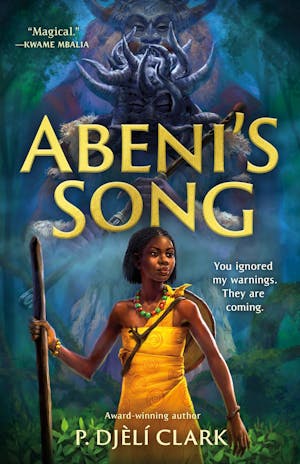CHAPTER ONETHE SONG
Damju awoke to the song.
It was a beautiful song.
It danced in her head—coming from everywhere, all at once. She sat up, opening her eyes to a familiar world of light and shapes. It was the way she saw, which had always been different from others. It was still night. Night was dull. Not like daytime that glowed. And there were night’s sounds that lulled her to sleep—chirping crickets, night birds, and howling animals that shared their small valley.
She tilted her head to listen. Only there wasn’t any of that now. There was only quiet—like someone had told the world to hush. There was just the song. Beautiful and strange, filling up her thoughts.
But where was it coming from? Who would be playing music so late? Standing, she ran fingers along the cracked mud walls of her home, careful not to stumble over her mother—who lay sleeping. She reached down to put a hand to where her two brothers should have been, but there was only emptiness.
Not long ago Damju could walk easily under calabash bottles hanging from their ceiling. But she’d seen almost twelve harvests now and the bottles grazed her hair as she moved to the door. She pushed through it and outside.
The night air was warm and still strangely quiet. But she wasn’t alone. She could just make out the shapes of people moving along narrow moonlit streets. Some were small. Others her height. All children, she realized in surprise. She frowned. What could they be doing? She reached out, catching someone’s arm.
“Wait! What’s happening?”
A breathless reply came. “The song, Damju! Can’t you hear it? Can’t you see—Oh! I’m sorry!”
Damju recognized the voice. Ewa, who always seemed to forget Damju saw differently. “I hear it. But what do you see?” How did you see a song?
Ewa fumbled. Her voice was strange—like someone still half asleep. “I can’t explain. But the song shows you things. Beautiful things!”
Damju was confused. A song that showed you things?
“Where are all of you going?”
“To find the song, of course,” Ewa answered. “Just like you.”
“What? I’m not—” She stopped, realizing her feet were moving! But when had she started walking? The song! She could feel it pulling at her, urging her on. Ewa shrugged away, leaving Damju between other children, all marching forward like a flowing river.
Fighting, she made her feet stop, planting them firm in the middle of the street as others pushed past. “Kambo! Dawda!” she called to her brothers. They had to be out here. But how long ago had they left home? How far might they have gone? The thought made her panic, and she shouted their names over and over into the night.
“Damju!” Someone grabbed her. Her brother! She clutched on to him.
“Kambo! Where’s Dawda?”
“Right here,” her other brother answered.
Damju breathed in relief. “I thought you were gone.”
“We almost were,” Dawda snickered. “Came back when we heard you calling after us like a loud goat!”
Dawda was always the one to make jokes. For once, Damju didn’t laugh.
“This song, it isn’t right! We have to—”
“It’s okay, Damju,” Kambo said.
“The song’s showed us what’s out there,” Dawda added.
“What? What did it show you?”
“Baba!” Kambo said. “He’s waiting for us!”
Damju stared up at the shape of her brother’s face, too stunned to answer. Other children passed by, and they were now the only ones just standing. Baba? Their father was gone. He’d died when she was small. Her brothers remembered him better than she did, but he was gone all the same. Did ghosts walk this night?
“I know how it sounds,” Dawda said. “But we saw him, Damju. Calling us.”
Something Ewa said came back. The song showed you things—beautiful things.
She shook her head. “No! It’s not real! The song! It’s showing you what you want to see. It must want you to—!”
“It’s fine, Damju,” Kambo assured her, his voice like Ewa’s now—half asleep. “We’ll come back, with baba.”
“No, don’t go!” But they were already gone, and her hands clutched at other children who pushed forward. One by one, they marched past the village’s low stone walls, chasing what the song showed them, the things Damju couldn’t see.
Somewhere in the valley came another curious sound. A woman’s voice. Damju thought the woman might be crying, and she fought to hear the words above the song.
The children. He has taken the children. Taken them from me. The children, the Children of Night …
When everyone had gone, she stood alone, until the song and the voice faded away.
CHAPTER TWOFESTIVAL
Somewhere very far away, Abeni woke up with a wide-mouthed yawn.
She’d been dreaming. Of a song, of all things.
But the dream was already getting fuzzy, the way dreams did. And the song and odd voice became distant echoes. Soon she couldn’t remember what they sounded like at all. Then she forgot entirely.
Today is my birthday.
Abeni smiled, taking a long stretch and wriggling her toes. Sunlight crept into her home through slight spaces in the straw roof, bringing the heat of the day to come with it. It was early, but already she could hear the familiar sounds of morning.
Chok-a-chok-chok-a-chok.
Her mother pounding yam outside. That meant her aunts were here. And that she’d overslept! Sitting up abruptly from her sleeping mat, she kissed the back of her teeth and shook her herself fully awake—so that her plaited hair swung from side to side. How could she oversleep on today of all days!
“Abeni!” her mother called from outside. “Are you really still sleeping?”
“Um, no!” she croaked. Swallowing, she found her voice. “I mean, no, mama!”
Her mother kissed the back of her teeth, the way she did when she didn’t quite believe you. “Well, I hope you’re dressed! It’s almost time to go!”
Dressed? Abeni looked down to her plain brown tunic and made a face. This wouldn’t do, not for today. She glanced at a pile of her clothes scattered in a corner. They wouldn’t do either. She jumped up, meaning to run, then slipped on her sleeping mat, and landed with a thud.
“Abeni?” her mother called. “What’s all that noise? What’s going on in there?”
“Nothing, mama!” she called back, hopping on one foot while nursing a stubbed toe—and glaring at the sleeping mat. This wasn’t how this morning was supposed to go!
Hurrying, she ran from her room. Her father had built their house before she was born, making it older than her. It had one long circular wall that was smooth to the touch and smelled of old earth. Smaller walls divided the house into separate parts. She passed through the cooking chamber where her mother’s planting tools hung beside her father’s hunting weapons. Reaching her parents’ chamber, she found a bundle of neatly folded cloths with colorful prints. Her mother’s best wrap skirts—which she was not supposed to touch. But she needed something nice for today. Rifling through them, she settled on a bright gold one, with spirals like little red snakes.
“Abeni!” Her mother’s voice had that tone in it now. “Do I have to come in there and get you?”
“No, mama! Just a moment!”
Finding a large jug of water, she checked her reflection. She’d thought that today, her twelfth birthday, her face would seem different—more grown. But it looked the same as the day before, and the one before that. Brown eyes and a dark brown face, with a fleshy nose above lips people claimed made it look like she was pouting. Her tight coils of black hair had been parted down the middle and plaited into thin hanging braids that she could swing back and forth. That had taken her aunts hours to finish yesterday. They hadn’t done it too tight, but it still hurt a bit if she raised her eyebrows.
Opening her mouth, she examined her teeth to see if they’d grown. Nope. Still the same size, even the same overbite. Altogether, she looked very much … the same. But it was her birthday. She was older. That was all that mattered.
“Abeni! Did you fall back asleep, girl?”
She broke away from her reflection. “I’m awake!” No time for a long bath. Wriggling out of her tunic, she scrubbed and dried quickly, wrapping the gold cloth about her. She tucked it in here and there—just right to make it stay on. She wasn’t any taller than any other girl her age in the village, but her mother and aunts fretted at her skinniness. Her father teased he’d have to tie rocks to her feet to make sure a strong breeze didn’t carry her away. She didn’t find that funny.
She looked down with a smile. The cloth was nice as a skirt on her mother, but as a dress it looked wonderful on her. Still, it was missing something. Rifling through more of her mother’s things, she found a set of necklaces—settling on one with sparkling green and red stones and snatching up the matching pieces nearby.
As she fitted on the jewelry her eyes caught sight of a small soapstone jar carved like a frog—where her mother kept her sweet oils. Opening the jar, she scooped out a handful and rubbed it everywhere. Satisfied, she slipped into her favorite red-brown sandals and stopped to admire herself. Or tried to.
“ABENI! If you’re not out here by the time I count to—!”
She was out the door before her mother even finished the sentence.
Her village was alive. Everywhere were other rounded houses like her own, their brown straw roofs today decorated with colorful flowers and strips of bright cloth. People moved about in the streets, some with arms full, others holding clay jars atop their heads—their voices louder than usual in the early morning.
“Eh! Look here. The princess has awakened to greet us!”
Abeni looked to see her father smiling at her. He wore a white kilt that fell to his feet, alongside strips of leather with black and red designs that hung from his waist. His shoulders and chest were bare, except for fresh spirals of white chalk.
“Akanyo, I didn’t know you were hosting the daughter of a chief,” the man who painted her father’s skin added.
“That must be it,” her father said as if surprised. “The daughter of a chief!”
The two men stopped to give her a deep bow.
Abeni rolled her eyes but smiled. Her Uncle Tawayo and her father loved to joke. The two were the strongest men in the village, and everyone respected them as great hunters. Today they were dressed almost exactly alike. Even their hair was the same, shaved on all sides except for a flat patch at the top.
“What do you say, Afayo?” Her father nudged her brother. “Doesn’t your sister look like a chief’s daughter?”
Her brother looked up from where he sat, decorating a long spear with bits of rope and beads. He wore his hair just like the two men, though he still looked like a boy. He gazed lazily at her dress before turning back with a shrug. “She looks okay.”
Abeni frowned. Okay? She simply looked okay? Her brother had seen three more harvests than her, but they’d always been close. Now he was all puffed up with himself, keeping to other older boys who soon would be counted as men. Well not today!
Copyright © 2023 by P. Djèlí Clark







